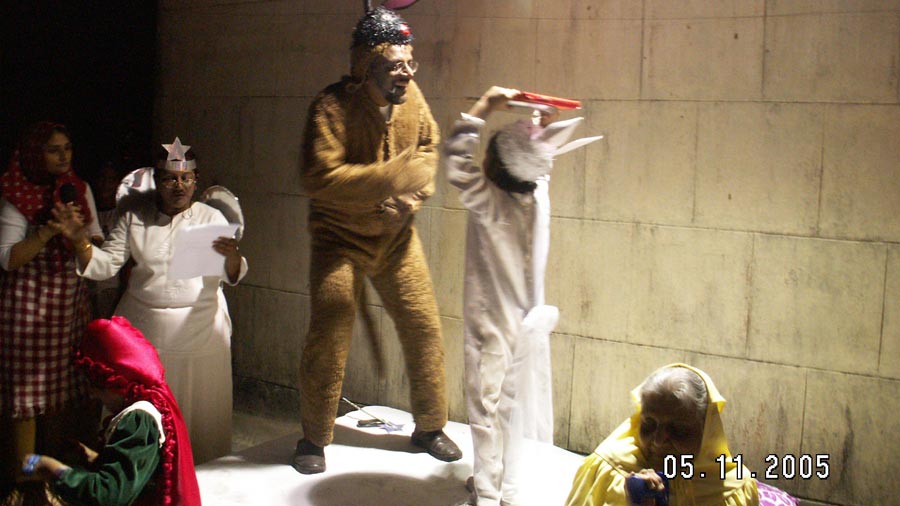‘What do you guys do on Eid?’
This question took me across 55 years, reunions, residential theft, stage fright, spirited revival and Netflix.
When my Bohra parents were Surat settlers in Kolkata during the Fifties, there was a need to protect their identity. Not as Bohras because that label was never in danger considering that they hardly engaged with people outside the community; what was at stake was something more precious — their Surtiness.
This Surtiness manifested in various ways in the Kolkata of 70 years ago: Surtis wore their shirts tucked inside their trousers, non-Surti Bohras wore it outside. Surtis prefixed names of fellow Surtis with ‘Bhai’, others suffixed the same word instead. Surtis ate measured with low chillies; non-Surtis stretched the caterer. Surtis spoke softer with a larger infusion of anglicised words, non-Surtis stayed to the vernacular.
Surtiness was a parallel religion and in danger; it needed to be saved from the urban melting pot. The most effective means of doing so was social grouping. Surtis married Surtis. Surtis created cricket teams of Surtis. Surtis created weekend leisure groups of Surtis. Surtis conducted bezique tournaments for Surtis.
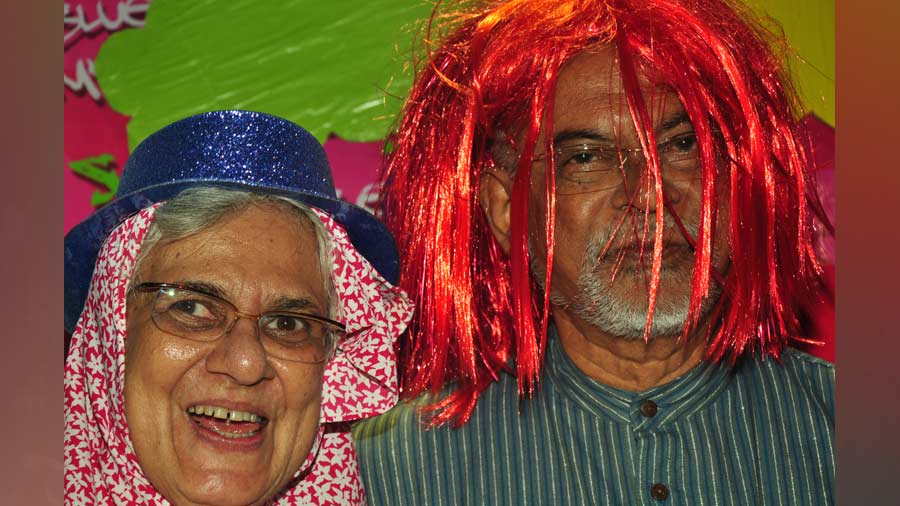
Guests at the picture prop corner on the terrace of Krishna Vihar
The Eid Reunion: Night of the Nights
The one annual event that celebrated this Surtiness was in itself a celebration. It was the Eid reunion (my childhood innocence pronounced it as E-drew-niun because that was how my mother referred to it). This was an annual get-together at Futnani Chambers (off New Market). Tickets were sold. Lucky draws were held on the ticket numbers (you got a toaster as a prize in those days). As soon as the Night of Power (Lailatul Qadr) would have been negotiated on 23 Ramzaan, the ladies of the family would start planning: “What will the children wear on Eid? Will it be right for them to repeat the same clothes for the reunion in the evening? What will they perform?”
The last week of Ramzaan would be partly spent in communion with one eye on the Quran and the other on some elocution textbook which Surti children crammed a part of by rote (with the expectation of generating applause for eight-line poems in English). This would be more than a reunion where you just wore your best ghagra-odhna and flashed your three-inch bracelet inherited across three generations; this was also where Surti elders went on stage to recite jokes while the rest of the assembled bumped into each other with “Arre, kem chho? Dekhaya nahin masjid ma! Roza thaya?” (How are you? Didn’t see you at the masjid. How did the fasts progress?), which would be repeated 16 times in 13 minutes until half the hall was privy to how Ben Sofa’s arthritic knee had prevented her from sitting in the second ‘saf’ (row) of the masjid, how Bhai Khadu missed three precious rozas due to a digestive bug and how Ben Zainab excused herself with “Bhai, mara si toh roza havay nahin thaata” (I am not able to fast any longer).
This is what I remember from this Night of the Nights: A crowd of more than 150, two hours of social intercourse, the hollering voice of principal organiser Uncle Mammi Faizullabhoy attempting to bring the assemblage to periodic order, stage fright after having been planted to face the crowd (followed by a rebuke for having let the Patherya name down) and a residential theft behind our back while we were blissfully attending one such event (my mother never went back to any Eid Reunion thereafter out of superstition, which she succinctly called “vehem”, as if every time she ventured towards Futnani Chambers, someone was going to creep up on our home in Premier House on Mission Row).
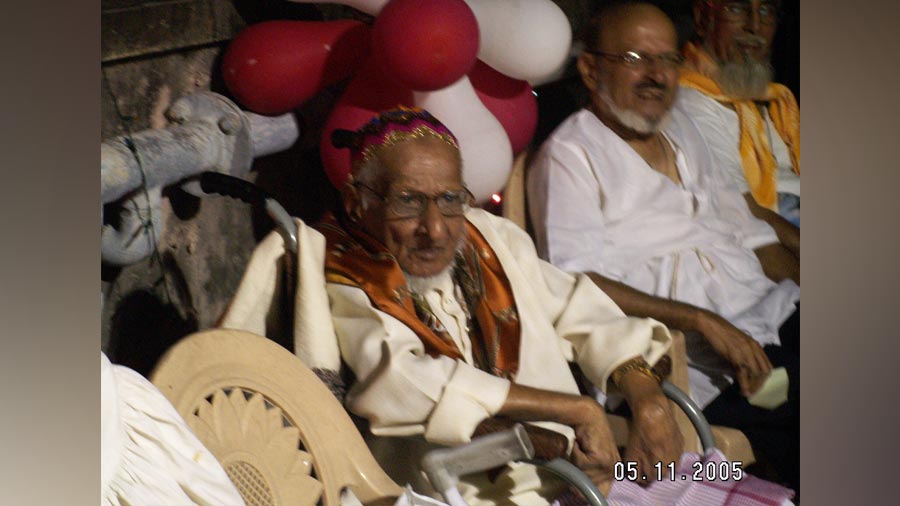
Eighty-five-year-old Mammi Faizullabhoy dressed as Shah Abdullah Bukhari at the meet in Krishna Vihar
The social orchestra died down in Futnani Chambers around the late Seventies. It could well have been that expenses exceeded ticket sales. Or that the ‘mixed gender’ event attracted the attention of the moral police. Or that Surtis fatigued after 30 days of fasting preferred to heal their gastronomic wounds in private.
‘E-drew-niun’: Revival of the most joyous evening of the year
This memory would have been obituarised but for something that transpired in 2004, 25 years after I had attended my last Eid Reunion. My wife and I decided to revive it. “What could be sadder than the most joyous evening of the year being spent eating khichdi-sarva under a 40-watt bulb in a thaal of three people?” Wife and I were on the same page for once.
The ‘E-drew-niun’ was reincarnated on the terrace of Krishna Vihar at 15 Sarat Chatterjee Avenue, across Rabindra Sarobar. No tickets (hence “Invite as many Surtis as one can”). No formal food (opening the doors to Mayaram’s pav-bhaji, streetside phuchka, kebabs, dosas and spicy biryani). Persuasive calls asking people to dress weirdly (so no compulsion that “qaumi libaas ma aavjo”). Picture prop corners (so you could be photographed looking silly without getting embarrassed). Entreaties to conduct skits (so no sitting politely in a corner making banal conversation). Quizzes. Games. Decorative lights. Improvised stage. Gifts for children. Child standing with saakar (flavoured sugar crystals) at the entrance.
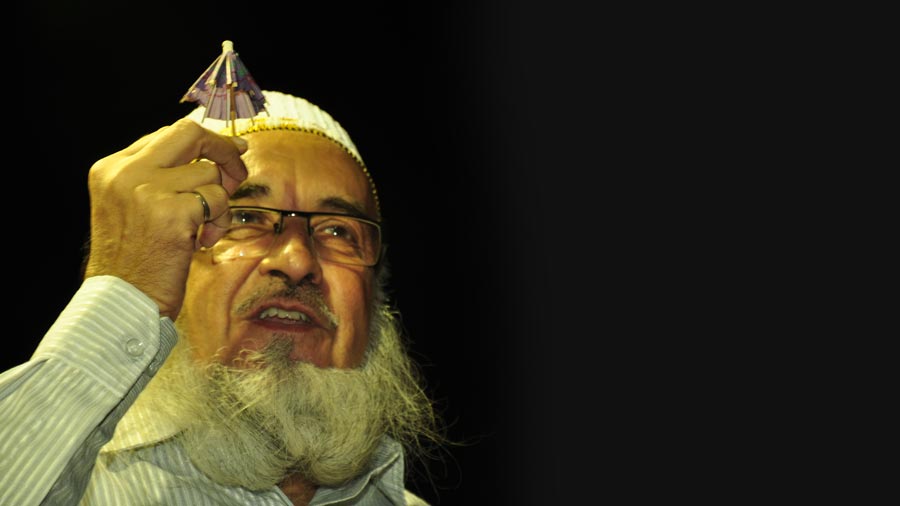
Abbas Currim with his umbrella
The 85-year-old Uncle Mammi came in a wheelchair dressed as Shah Abdullah Bukhari and put on a one-act skit. A child turned up dressed like an angel with an outsized wing at the back that narrowly skirted past the lift’s collapsible gate. The 83-year-old Aunty Khata came as Charles Chaplin. The devout Zainab M acted an unforgettable scene of two lovers under an umbrella, each leg alternating for a partner.
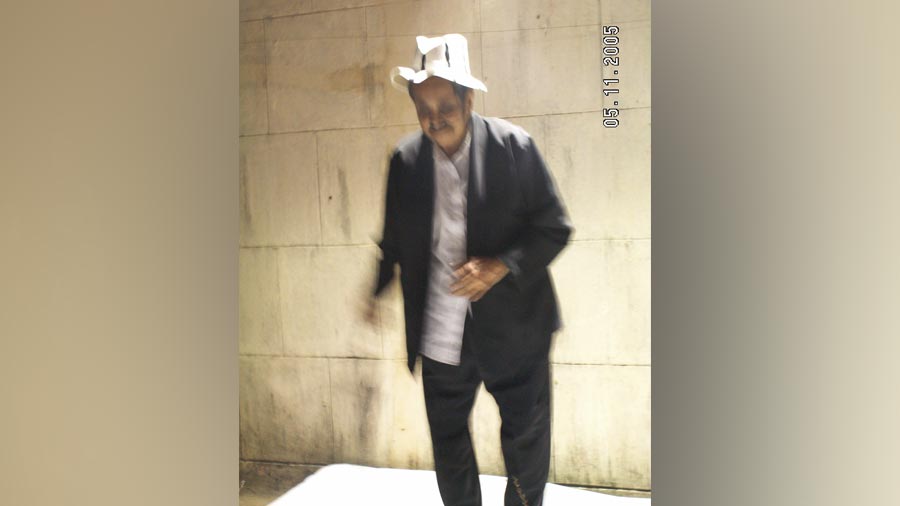
Eighty-three-year-old Aunty Khata as Charles Chaplin
The usually tense Ayman T brought the house down with an impersonation of what happens inside the ladies’ wing of the masjid during a space crunch. Khursheed K recalled a street scene from the Surat of the Fifties. Taher K impersonated the lungi-clad domestic help suffering the employer’s tyranny. Elyas and Ayman K enacted a play from the past. Justice Nadira P played the grandmother from Little Red Riding Hood. Dr Maria N and her group dressed as qawwals right down to the red handkerchief tied to their wrists — and then performed. Mohammed and Silloo T had banana leaves coming out from behind their ears. Abbas and Ammi M were photographed in 20x outsized spectacles. The Patherya family enacted the Red Riding Hood story around a Bohra-Ramzaan adaptation.
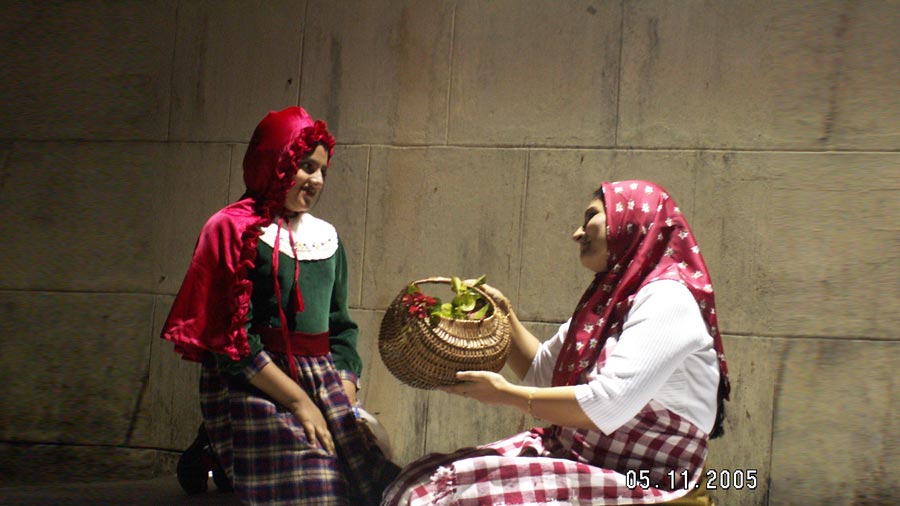
Another scene from the Patheryas’ Red Riding Hood
These were people who could be dismissed as grim Muslims, neck bent into their Quran copies through Ramzaan. They created such a terrace racket that neighbours on the fifth floor called the gateman on the intercom to ask “Sab theek hai?”
We sent out invites again the following year. This time to more people. Then again the third year to even more — non-Surtis as well. The word rippled across the Bohra diaspora that the E-drew-niun was back — if slightly crazier, more inclusive and with a broader vision: ‘Include anyone. The Eid night was not a night to be spent alone at home.’ We invited some non-Muslim friends who sang, mingled and thanked us for the occasion to break bread with people generally dismissed as ‘the other’.
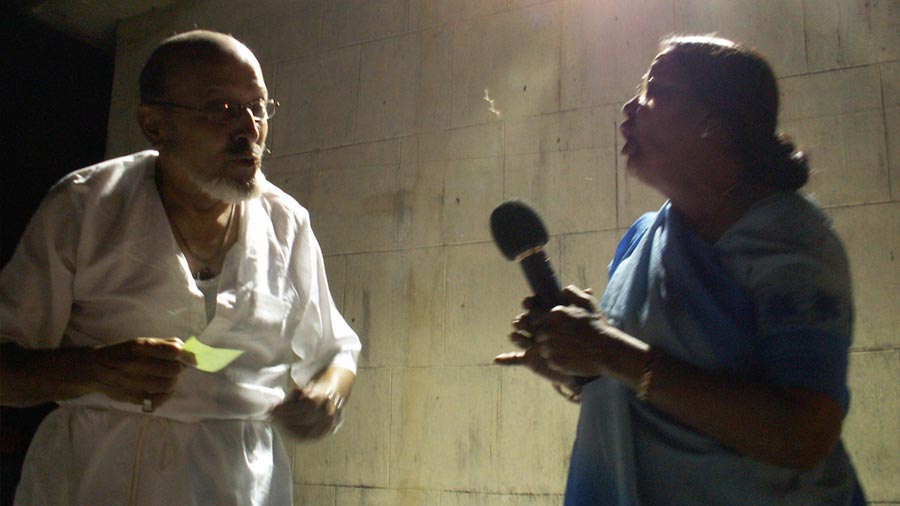
Elyas and Ayman K enacting a play from the past
Netflix, Swiggy and WhatsApp group greetings
And yet. Even this institution died out a few years ago, partly because Eid night coincided with the monsoons and one couldn’t quite do this inside the community hall of a gated complex. Our collective Eid celebration returned to the Dark Ages. No one bothered to revive (the stray comment I picked up was “Bahu thaaki gayaa chhey” or “We have been greatly fatigued”). These are the outcomes then. We do not turn to one another and ask “Roza thaya?” We do not iron special dresses. We do not seek poetry pages to recite from. We do not fret over drama lines we may forget. We do not not discuss the masjid for a change.
Instead, we turn to Netflix, requisition Swiggy, watch two films on the trot, say “mubarak” to children in different time zones, create WhatsApp groups and blast ‘Eid Greetings’ messages and whine that it is no longer the way it used to be.
I hope that answers the question.
